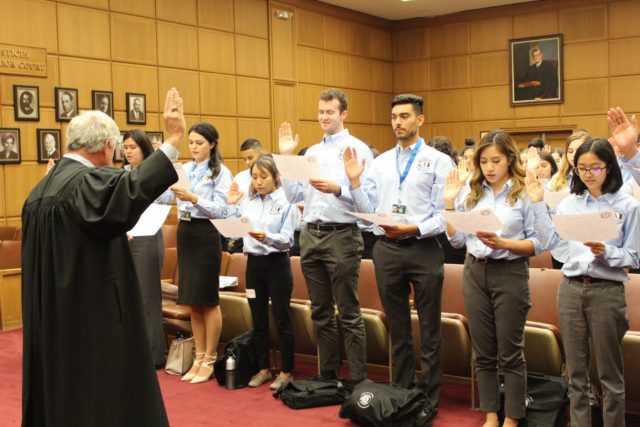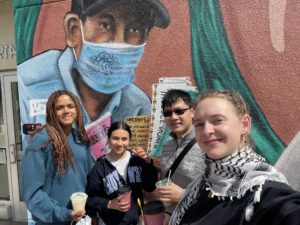Editors note: This article contains a mention of domestic abuse that some readers may find distubring.
Alexis Bembry’s client was ready to give up before walking into the Stanley Mosk Courthouse.
After the client experienced domestic abuse from her seven-year-old son’s alcoholic father, Bembry said the woman arrived at the courthouse’s self-help center in tears, planning to file a restraining order. A system outage meant the client had to complete stacks of legal paperwork fully from scratch – a process that took three hours.
But her client was not alone.
Bembry, a fourth-year economics and public affairs student and JusticeCorps legal access intern, said she sat beside the litigant for those three hours, helping her navigate filing a restraining order and reassuring her that things were going to be OK for the client and her son.
“That’s the goal, right?” Bembry said. “It’s not necessarily to fill out paperwork but to empower people to help themselves.”
JusticeCorps, which students access through the UCLA Center for Community Engagement, provides civil legal aid for people who cannot afford an attorney, according to their website. In partnership with the Los Angeles Superior Court, student volunteers are guided by attorneys to provide legal assistance to community members.
However, their work may soon be put on pause.
April 25, the Trump administration cut nearly $400 million in funding grants to AmeriCorps – the federal service agency that oversees JusticeCorps.
According to America’s Service Commissions, a non-profit that helps oversee service programs across the country, 32,000 volunteers and staff at AmeriCorps were laid off. Anna Kelly, a White House spokesperson, said Americorps was a “target-rich environment for President Trump’s agenda to eliminate waste, fraud, and abuse.”
JusticeCorps LA is among 87 AmeriCorps-funded programs in California impacted following the budget cuts, according to EdSource.
UCLA students who volunteer at JusticeCorps assist litigants in filing restraining orders, changing custody agreements and battling eviction cases in courthouses across LA, said Jennifer Kalish, the program director of JusticeCorps LA and a UCLA alumnus. Students offer neutral legal information but do not provide professional legal advice, said Mikayla Cardona, a third-year public affairs student.
Kalish said LA’s self-help centers are heavily dependent on the program because students assist clients with filing claims. She added that the future is uncertain for those who rely on their services – many of whom face systemic barriers to legal support.
“Practically everyone who walks in our doors comes in in crisis,” Kalish said. “They’re losing a home, they’re losing access to custody of their child, they’re divorcing – their marriage is ending.”
Shannon Tieu, a fourth-year political science and sociology student, said during her time in the program, she guided a woman on the brink of eviction through a confusing web of legal paperwork – a task made even more urgent by the fact that the woman lived in rat-infested housing without utilities.
Tieu, who worked in the self-help center and the small claims department, added that, without JusticeCorps, the legal system will become even more inaccessible to low-income communities.
The program also provides a year-long postgraduate fellowship where fellows mentor JusticeCorps interns full-time. Amelia Shaffer, a fourth-year political science student, said after completing her hours of service as an intern, she was excited to be accepted into the fellowship for her gap year.
But following the news of funding cuts to AmeriCorps, the court notified Shaffer through email that the future of the fellowship is uncertain, she said.
“I’m not a fan of the administration or DOGE in the slightest,” Shaffer said. “If their whole philosophy is ‘America First,’ this is a program that is helping Americans every single day.”
Students who applied for the 2025-2026 cohort of JusticeCorps for the LA region were informed May 28 that its contracts with AmeriCorps had been terminated and that interviews for Legal Access Interns would be paused, said Alexa Ocio, the program coordinator, in an email to the applicants.
JusticeCorps students who complete 300 volunteer hours were also eligible for an education award around $1,500. However, students were told by program staff that they would receive an adjusted scholarship amount based on the hours they had completed prior to the funding cuts, Cardona said.
As well as not receiving the full amount of her scholarship, Yassna Khosravi, a third-year political science and psychology student, said she found the loss of the program the most upsetting.
“Just the knowledge that that’s being taken away from so many people was really heartbreaking for me,” Khosravi said. “It was a very jarring experience to have that knowledge that – if they aren’t able to figure out how to save this program – so many people are going to just be left lost.”
Doug Barrera, the UCLA senior associate director of the UCLA Center for Community Engagement, said the loss of the internship opportunity for students will make the search for internships more challenging and competitive. Currently, there are 84 undergraduate students in the LA program – 45 who are currently at UCLA, according to Carolina Canseco, a program coordinator for the LA Superior Court.
“We have students who are probably less prepared to enter the workforce because they haven’t had that experience of having an internship and don’t even know where to start,” Barrera said.
Kalish, who became the program director for JusticeCorps LA in 2004, said her goal was to help students apply skills they were learning in the classroom to real-world situations.
“Having to learn how to communicate with the attorneys who are your supervisors – maybe with judges who you might be interacting with. I think that all of those are just experiences that people don’t normally get as an undergraduate in either an internship or a job,” Kalish said.
JusticeCorps LA also provides networking opportunities with lawyers and judges for students to navigate possible careers in law, offers law school recommendation letters and holds Law School Admission Test workshops to help students succeed on the exam, she added.
Shaffer said the JusticeCorps internship solidified her interest in pursuing a legal career focused on serving marginalized communities. She said her most meaningful experiences in the program involved providing legal help to domestic violence survivors and people on the brink of homelessness.
“The program was the best thing I’ve ever done in my life,” Shaffer said. “Genuinely, every day that I would go into service, I would know that I would help at least one person.”
Tieu said she believes JusticeCorps students would continue their work despite the funding cuts, as they are motivated by community service rather than financial rewards. She said her first year in the program opened her eyes to the importance of combating inequities in the legal system.
“Without it, I think we’ll be seeing a lot more barriers to the legal system,” Tieu said. “People wouldn’t be able to seek the justice that they deserve.”






Comments are closed.